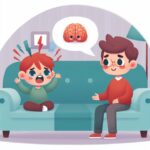Identifying signs of sleep disorders in toddlers can be a puzzling and sometimes worrying process for many parents. Understanding these signs is crucial for the well-being of your little one. Sleep is not just a rest period; it’s a critical component of your child’s health and development. In this article, we’ll dive deep into the signs that may indicate a sleep disorder in toddlers, providing parents with the knowledge they need to seek appropriate care and solutions.
Understanding Sleep Disorders in Toddlers
Sleep disorders in toddlers can manifest in various ways, affecting their overall health and development. These disorders range from difficulty falling asleep, staying asleep, to abnormal behaviors during sleep. Recognizing these issues early can lead to timely interventions and support. It’s important to note that occasional disturbances in sleep might not indicate a disorder but observing consistent patterns can suggest underlying issues.
Common types of sleep disorders include insomnia, sleep apnea, restless legs syndrome, and night terrors. Insomnia in toddlers might show as difficulty falling asleep or waking up frequently during the night. Sleep apnea is characterized by pauses in breathing, often leading to disrupted sleep. Restless legs syndrome causes uncomfortable sensations in the legs, compelling movement, and can significantly hinder falling asleep. Night terrors, distinct from nightmares, involve intense fear, screaming, and even getting out of bed, though the child is still asleep and won’t remember the episode in the morning.
Signs of Sleep Disorders in Toddlers
Identifying signs of sleep disorders in toddlers is the first step towards finding a solution. Some common signs include:
- Difficulty falling asleep or staying asleep
- Frequent waking during the night
- Restlessness or moving a lot during sleep
- Breathing irregularities, such as snoring or pauses in breathing
- Excessive daytime sleepiness or hyperactivity
- Unusual sleep behaviors, like sleepwalking or night terrors
If your toddler exhibits any of these signs consistently, it may be worth consulting with a pediatric sleep specialist. Early intervention can alleviate symptoms and ensure your child gets the restful sleep they need for healthy development.
For more detailed insights, consider visiting our comprehensive guide on sleep disorders in toddlers.
When to Seek Professional Help
While it’s normal for toddlers to experience occasional sleep disturbances, persistent or severe signs should not be overlooked. It’s crucial to seek professional help if sleep disorders significantly impact your child’s daytime functioning, mood, or overall health. A pediatrician or sleep specialist can assess the severity of the condition and recommend appropriate treatments or interventions.
Timely intervention can make a substantial difference in managing signs of sleep disorders in toddlers. Treatment options may include behavioral therapies, establishing a consistent bedtime routine, or in some cases, medical intervention. Each child is unique, and a tailored approach is often necessary to address the specific needs of your toddler.
For advice on establishing a sleep schedule, click here. If your toddler faces difficulties transitioning to sleep alone, this article might offer valuable strategies. Additionally, understanding circadian rhythms in toddlers can further assist in creating a conducive sleep environment.
Remember, recognizing and addressing signs of sleep disorders in toddlers early can pave the way for healthier sleep habits and overall well-being. Consult with professionals, consider recommended strategies, and observe your child for any improvements or need for further intervention.
Sleep is a vital component of your toddler’s growth and development. Ensuring they get adequate, restful sleep not only supports their physical health but also their emotional and cognitive development. Armed with the right knowledge and resources, you can help your child overcome sleep challenges for a brighter, more restful future.













